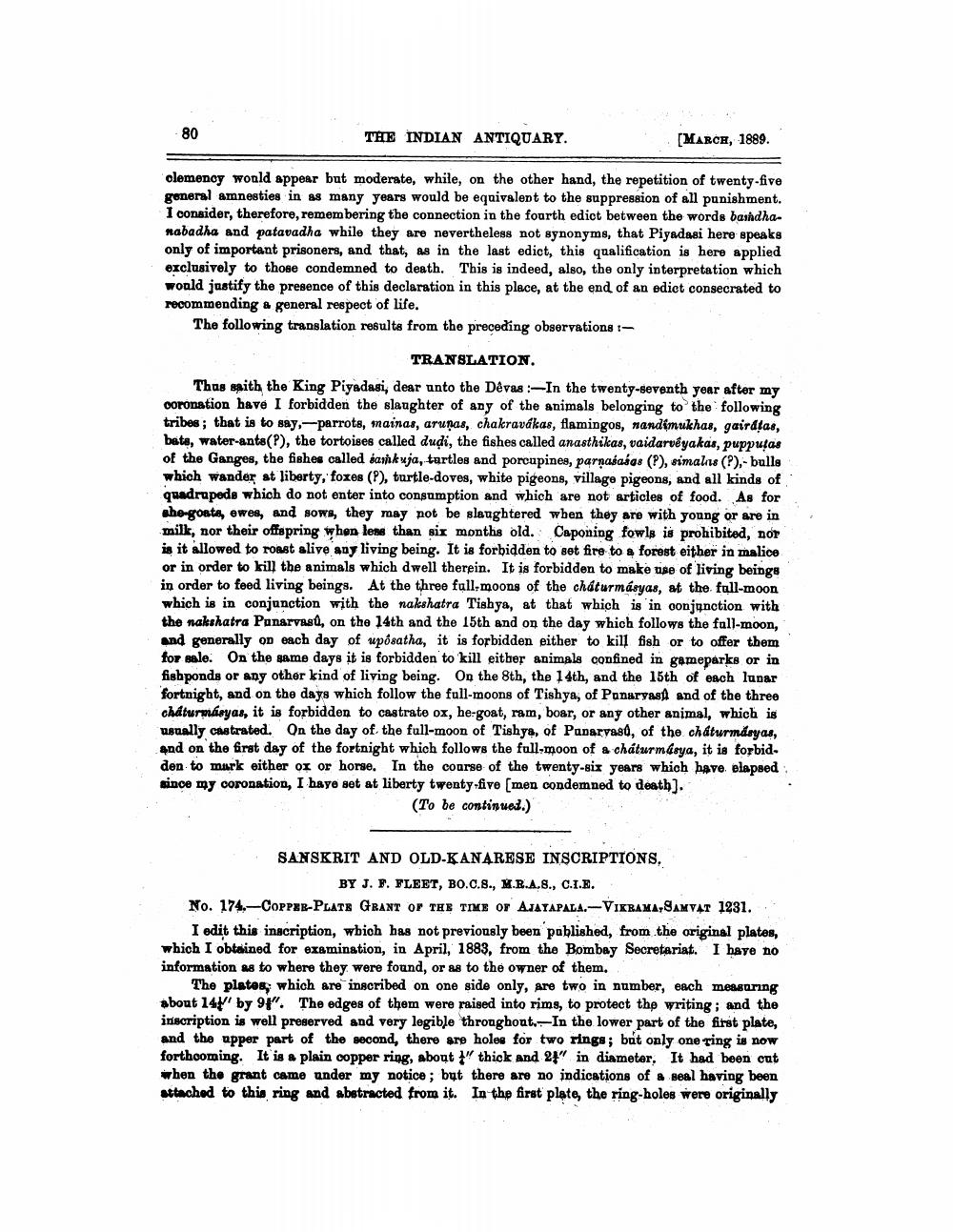________________
80
THE INDIAN ANTIQUARY.
[MARCH, 1889.
olemenoy would appear but moderate, while, on the other hand, the repetition of twenty-five general amnesties in as many years would be equivalent to the suppression of all punishment. I consider, therefore, remembering the connection in the fourth edict between the words basadhanabadha and patavadha while they are nevertheless not synonyms, that Piyadasi here speaks only of important prisoners, and that, as in the last edict, this qualification is here applied exclusively to those condemned to death. This is indeed, also, the only interpretation which would justify the presence of this declaration in this place, at the end of an edict consecrated to recommending a general respect of life.
The following translation results from the preceding observations -
TRANSLATION. Thus with the King Piyadasi, dear unto the Devas :-In the twenty-seventh year after my ooronation have I forbidden the slaughter of any of the animals belonging to the following tribes; that is to say, -parrots, mainas, aruņas, chakravákas, flamingos, nandimukhas, gairdtas, bats, water-ants(P), the tortoises called dudi, the fishes called anasthikas, vaidarvéyakas, pupputas of the Ganges, the fishes called sankuja, tartles and porcupines, parnasaias (), simalns (?),- bulls which wander at liberty, foxes (P), turtle doves, white pigeons, village pigeons, and all kinds of quadrupeds which do not enter into consumption and which are not articles of food. As for she-gosta, ewes, and sows, they may not be slaughtered when they are with young or are in milk, nor their offspring when less than six months old. Caponing fowls is prohibited, nor is it allowed to roast alive any living being. It is forbidden to set fire to a forest either in malice or in order to kill the animals which dwell therein. It is forbidden to make use of living beings in order to feed living beings. At the three full moons of the cháturmásyas, at the full-moon which is in conjunction with the nakshatra Tishya, at that which is in conjunction with the nakshatra Panarvas, on the 14th and the 15th and on the day which follows the fall-moon, and generally on each day of uposatha, it is forbidden either to kill fish or to offer them for sale. On the same days it is forbidden to kill either animals confined in gameparks or in fishponds or any other kind of living being. On the 8th, the 14th, and the 15th of each lupar fortnight, and on the days which follow the full-moons of Tishya, of Panaryasth and of the three cháturmásyas, it is forbidden to castrate ox, he-goat, ram, boar, or any other animal, which is usually castrated. On the day of the full-moon of Tishya, of Panarvas0, of the cháturmasyas, and on the first day of the fortnight which follows the full-moon of a cháturmasya, it is forbid. den to mark either ox or horse. In the course of the twenty-six years which have elapsed since my coronation, I haye set at liberty twenty-five (men condemned to death).
(To be continued.)
SANSKRIT AND OLD-KANARESE INSCRIPTIONS,
BY J. F. FLEET, BO.C.8., M.B.A.S., C.I.E. No. 174.-COPPER-PLATE GRANT OF THE TIME OF AJATAPALA.-VIKRAMA SAMVAT 1231.
I edit this inscription, wbich has not previonsly been published, from the original plates, which I obtained for examination, in April, 1883, from the Bombay Secretariat. I have no information as to where they were found, or as to the owner of them.
The plates, which are inscribed on one side only, are two in number, each measuring about 147 by 91". The edges of them were raised into rims, to protect the writing; and the inscription is well preserved and very legible throughout.-In the lower part of the first plate, and the upper part of the second, there are holes for two rings; but only one ring is now forthcoming. It is a plain copper ring, about thick and 21" in diameter, It had been cut when the grant came under my notice; but there are no indications of a heal having been attached to this ring and abstracted from it. In the first plate, the ring-holes were originally




